In this
article Boris Dolgov, a member of the Russian Academy of Sciences and
the Institute of Oriental Studies in Moscow, reports on his recent trip
to Syria. His field investigation is particularly valuable since most of
the information about Syria in recent months has emanated from Beirut,
Paris or London. Professor Dolgov confirms that, far from a contrived
"Arab Spring" scenario, Syria is undeniably grappling with the threat of
foreign occupation. He observes that while the offensive is
inordinately violent, the population will not be intimidated. Aware of
the disaster wrought by NATO "humanitarian" operations in Yugoslavia and
Libya, the Syrians refuse to be drawn into a sectarian ambush. A
process of reform and development is on track, but it will not be
dictated from abroad. In Syria, one may object to the president, but not
to national sovereignty.
The current situation in Syria remains one of the
most important components of the Middle Eastern and international
policies. Using Syria’s domestic crisis and pursuing their own goals
NATO, Israel, Turkey and the monarchies of the Persian Gulf are trying
to undermine the Syrian regime.
Since the beginning of the crisis in Syria I have made two trips to
that country as a member of international delegations in August 2011 and
in January 2012. If we watch the dynamics of situation’s development
over that period on the one hand we can state intensification of
terrorist groups in Syria and on the other hand we see a broader
people’s support of President Bashar Assad and a clear demarcation of
political forces’ positions.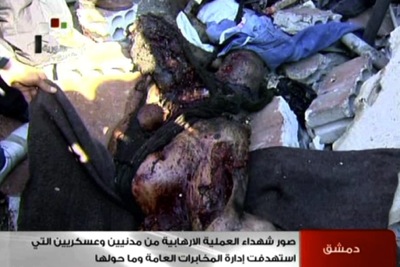
- Two car bombers blew themselves up outside the heavily guarded compounds of Syria’s intelligence agencies, killing at least 44 people and wounding dozens more in a brazen attack in December 23, 2011.
Terrorist attacks in Damascus became one of the bloodiest. Two of them were carried out on December 23, 2011 when cars loaded with explosives went off in front of the buildings of state security service killing 44 and injured about 150 people. On January 6, 2012 on a busy street a suicide bomber attack killed 26 and wounded 60. There were officers of the law enforcement agencies among the victims but most of the victims were occasional by-passers.
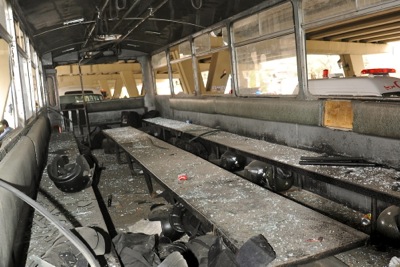
- Terrorist bombing in the al-Midan neighborhood of Damascus.
After terrorist attacks in Damascus demonstrations with slogans supporting Bashar Assad and condemning terrorists were held everyday. Similar demonstrations were organized in other large cities such as Aleppo, Homs, Hama, Daraa, Deir az Zor. These demonstrations were covered by the Syrian TV. During our stay in Syria we could move around the city freely and speak with people as we liked but we did not see any single anti-governmental rally. Most of the rallies’ participants were young people.
Syrian President Bashar al-Assad waves at supporters during a public appearance in Damascus on January 11, 2012 in which he vowed to defeat a "conspiracy" against Syria.
The most massive rally which gathered tens thousands of people was held on January 1 in the center of Damascus. At that rally Bashar Assad addressed to the nation starting his speech with the words: “Brothers and sisters!” He was speaking about a thousands year long history, the need to fight terrorism and the support terrorists receive from abroad. Assad’s speech was received with real enthusiasm and there were no signs that this reaction had been staged.
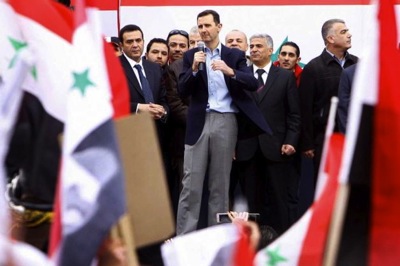
- Syrian President Bashar al-Assad waves at supporters during a public appearance in Damascus on January 11, 2012 in which he vowed to defeat a "conspiracy" against Syria.
After the adoption of a new law on political parties an active process of their creation has been underway in Syria. Although formally the constitution envisaged a multiparty system and seven parties were represented in the parliament, in compliance with clause 8 the leading role belonged to the ruling Baath party. Currently there is a wide discussion in Syria about this clause. An official with the Syrian Foreign Ministry told us that in the new constitution (on which the national referendum would be held in February), this clause would be abolished if most of the public and political forces spoke for it.
In his address to the nation Bashar Assad said that the new constitution would be approved in March 2012. The parliamentary elections are to be held in May-June 2012. Along with the law on political parties new laws on general elections, local administration and mass media were adopted. In compliance with the new law in December 2011 elections to the local governments were held. But because of the threat of terrorist attacks the turnout was only 42%, which was confirmed by the Baath officials. Nevertheless, the local administrations were elected and began to work. Under the recently adopted law new mass media are being formed in addition to the current 20 TV channels, 15 radio stations and 30 newspapers.
At present there are three main trends in the Syrian patriotic opposition – democratic, liberal and left, which is mainly a communist one. The Syrian Social Nationalist Party is the most influential party among the democratic forces. It is also the oldest party which was established in 1932. As Iliah Saman, a member of the political bureau of the Syrian Social Nationalist Party said, the party’s program is more conservative in comparison with the Baath’s program. Nevertheless there are no differences of principle between the two parties. According to him, the policy of the US, France and England is the main destabilizing factor in Syria. He said that those countries were acting in the interests of Israel and had the goal to divide Syria into five state formations on the basis of religious and ethnical differences.
The liberal trend of the opposition is represented by the recently registered secular democratic social movement led by Nabil Feysal, one of the Syrian intellectuals, a writer and a translator. He is an outright opponent of the Islamic fundamentalism, supporter of the liberal democracy. His goal is to turn Syria into “Middle Eastern Denmark”.
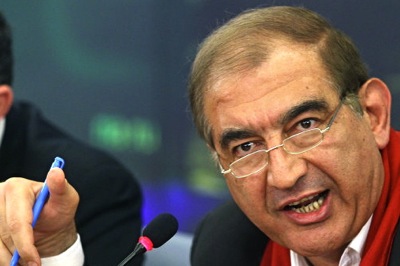
- Qadri Jamil, head of the Popular Will Party.
The coordination committees are also significant political force which has contacts with the Popular Will Party. These committees on the one hand organize demonstrations demanding concrete reforms and better living conditions on the other hand act as self-defense units which armed people protect their districts from attacks of terrorist groups in particular from a so called Free Syrian Army. It should be noted that although in the beginning of protests in Syria, part of the population, including intellectuals shared the opposition discontent with the regime and supported demands on democratization now, after intensification of terrorist groups, they tend to support the regime and the reforms proposed by the government.
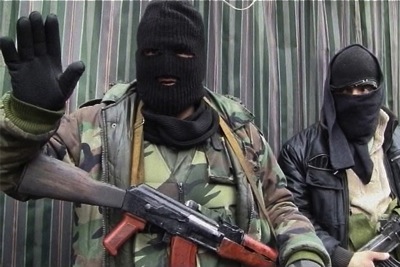
- "Free" Syrian Army elements.
Many people we contacted in Syria including independent foreign reporters told us about the information war against Syria. According to them, Qatari channel Al Jazeera, for example, in order to broadcast a report on mass anti-governmental rallies in Syria made a fake footage with the help of computer editing using dozens of atmosphere players and decoration of Syrian streets, a kind of “Hollywood village”.
As for the Syrian opposition abroad, its political part is represented by the Syrian National council with the headquarters in Istanbul. It is headed by Burhan Ghalioun, a Syrian-French political scientist at the Sorbonne University in Paris. It is quite a heterogeneous formation which comprises groups with different goals. They represent the Muslim Brotherhood and other Sunnite organizations, Kurdish separatists, Liberal-Democratic dissidents who usually reside in Europe and in the US.
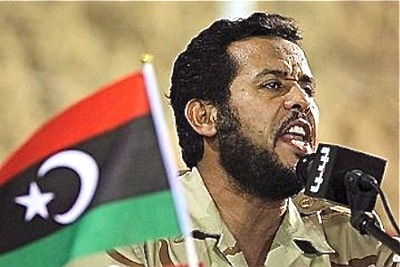
- Abdel Hakim Belhaj, chief of ’Al-Qaeda in Libya’ and commander of the "Free" Syrian Army.
The future development of the situation in Syria depends in many ways on the ability of the ruling regime to consolidate public forces and conduct the announced reforms. Other priorities are the liquidation of terrorist groups and stabilization of the domestic situation. In its turn this issue is directly linked to the development of the global policies and will depend on the activities of the leading countries of NATO, Turkey, the Arab League (which sent its monitors to Syria) Russia and China.
As for Russia, it firmly declares that repetition of the “Libyan scenario” in Syria is inadmissible.
No comments:
Post a Comment